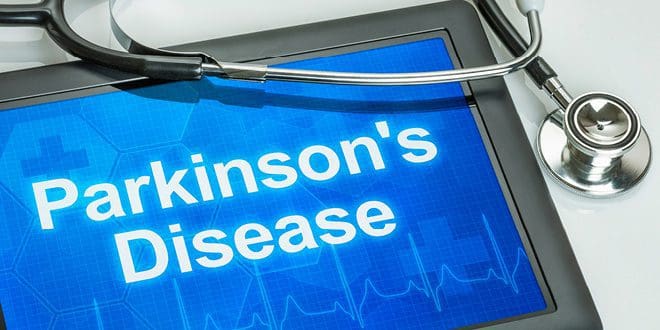Parkinson’s Disease
Parkinson’s disease is a brain disorder that causes shaking (tremor), difficulty with coordination, movement and walking. It is caused by the progressive degeneration of nerve cells in the central area of the brain. This causes a deficiency of the brain chemical dopamine, which is required for smooth, coordinated movement. When approximately 70 percent of the brain cells that produce dopamine are damaged, the symptoms of Parkinson’s disease develop. The disease can affect one or both sides of the body.
Who develops Parkinson’s disease?
Parkinson’s disease affects approximately two in every 1, 000 people and is most common after the age of 50. One in seven people with the disease are diagnosed before the age of 50; this is thought to be due to genetic factors.
Symptoms of Parkinson’s disease
The number of symptoms a person experiences and their intensity varies greatly. The most common symptoms of Parkinson’s disease are:
- Tremor (shaking)
- Shuffling gait
- Slow body movements
- Rigidity and stiffness of the muscles
- Difficulty bending the arms or legs
- Difficulty initiating a voluntary movement – such as difficulty beginning to walk
- Stooped posture
- Small handwriting
- Lethargy
- Finger-thumb rolling (pill-rolling tremor)
What causes Parkinson’s disease?
There is no widely accepted cause of Parkinson’s disease, however, a number of risk factors have been identified, including:
- Exposure to pesticides, toxins and chemicals. This includes occupational exposure to chemicals, pesticide residues on fruit and vegetables as well as exposure to bug sprays in the home.
- Exposure to aluminium. High levels of aluminium have been detected in the brain of Parkinson’s disease patients.
- Head trauma or stroke.
- Genetic factors are responsible for a small number of cases.
- Autoimmune disease. Parkinson’s disease shares some features with autoimmune conditions.
- Deficiency of folate acid in the diet. Folate is vitamin B9 and is predominantly found in green leafy vegetables, as well as oranges, asparagus, lentils and chickpeas.
- High levels of inflammation in the body. There are several possible causes, including antioxidant deficiencies and diets high in omega 6 polyunsaturated fats.
- Women who have had both ovaries surgically removed are at approximately twice the risk of developing Parkinson’s disease.
Conventional medical treatment
The treatment of Parkinson’s disease is aimed at controlling the symptoms. Medication can be given to increase the level of dopamine in the brain; the most common drug is Levodopa (also known as L-dopa). It works for approximately 80 percent of people but can produce very unpleasant symptoms, including involuntary jerking and twitching movements, or it may become increasingly ineffective. Treatment may also involve neurosurgery and physiotherapy.
General recommendations
- Follow a diet high in raw vegetables, fruit and regularly consume raw vegetable juices. They will provide you with ample quantities of antioxidants, which reduce inflammation in your body, including in your brain. Fruit and vegetables are also high in folic acid, which is known to reduce the risk of Parkinson’s disease.
- Minimize your exposure to pesticides, insecticides, fungicides and other environmental chemicals.
- Exercise is known to protect brain cells from degenerative damage. Research in mice has shown that exercise can even specifically protect the brain cells that produce dopamine.
- Ensure you get plenty of beneficial fats in your diet. Good fats are found in olive oil, oily fish, avocados, raw nuts and seeds, extra virgin coconut oil, flax seeds and eggs.
- Ensure you get enough vitamin D; it is known to help protect against Parkinson’s disease. The most reliable way is to receive approximately 20 minutes of sunshine on your skin three times a week. Dark skinned people require longer periods of sun exposure to obtain enough vitamin D. Sunscreen inhibits your skin from manufacturing vitamin D. This vitamin is also found in some foods, including fish, egg yolks and some dairy products.
Recommended books
- “Magnesium – The Miracle Mineral”.
- “Raw Juices Can Save your Life”. This book will give you many juice recipes that are high in antioxidants and folic acid.
- “Alzheimer’s: What you Must Know to Protect your Brain”. This book gives vital information on how to protect your brain cells from damage and is equally beneficial for people concerned about Parkinson’s disease.
- “Healing Autoimmune Disease”. This book provides information about healing the gut and reducing inflammation.
Recommended supplements for Parkinson’s disease
- Magnesium Tablets or Powder
Take 2 tablets twice daily or 1 teaspoon daily. Many patients with Parkinson’s disease are magnesium deficient, and magnesium can help with the muscular problems present with this condition. - Fish Oil
Take 1 to 2 capsules three times daily. Omega 3 fats are present in the brain in large quantities and they have anti-inflammatory properties. - Selenomune
Take 1 capsule daily with food. Selenium can help to mop up the free radicals that cause degenerative changes in the brain. - Vitamin D
Take 1 capsule daily with food. Vitamin D insufficiency is very common and can worsen all inflammatory or degenerative conditions.
The above statements have not been evaluated by the FDA and are not intended to diagnose, treat or cure any disease.


Leave A Comment